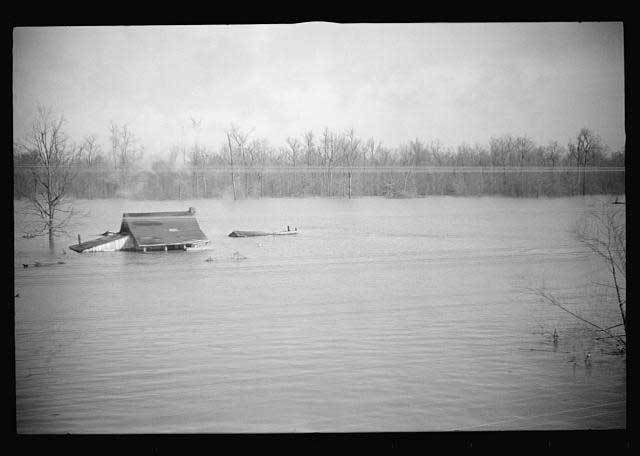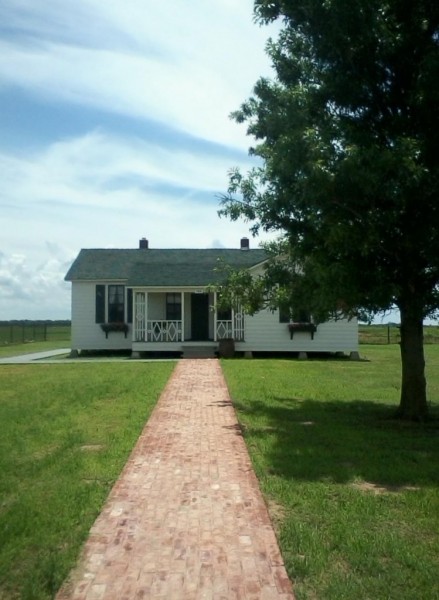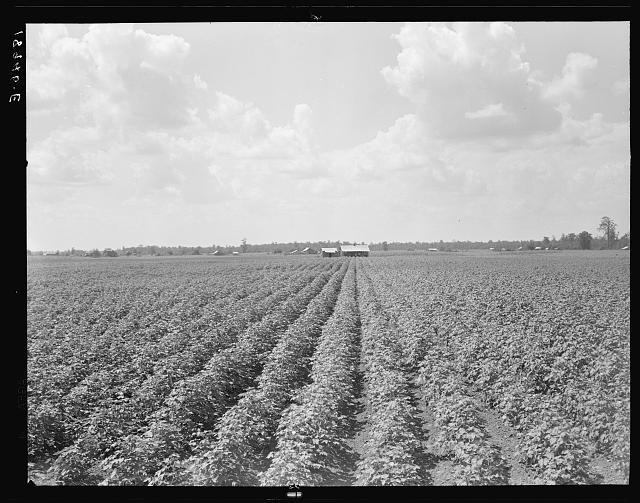Johnny Cash was born 26 February 1932 in Kingsland in Cleveland County, Arkansas. His parents were Ray (1897-1985) and Carrie Cash (1904-1991). Johnny was the fourth of seven children. His parents named him J. R., but neither the J nor the R stood for anything. It was only until the 1950s that the famous “Man in Black” went by the name Johnny Cash.
Kingsland is best-known for being the birthplace of Johnny Cash. The town was, and is, a small one. Today it numbers about 450 people. In 1932, the town mostly devoted itself to cotton picking and lumber. "I'm a country boy and I've still got a little of the cotton patch dirt between my toes," Johnny Cash said in the 1950s. "All my people are Missionary Baptists [though his mother originally was Methodist] and the largest part of them live in the state of Arkansas. I'm proud of them of course. All of them are decent people, even though one of my uncles is known to be the biggest liar in the solid south, he's a decent liar."
Johnny Cash was born during the Great Depression, which began with the stock market crash of October 1929 and did not truly end until the nation geared up for war in 1941. During the depression, Ray Cash remembered cotton.
Went down to almost nothing. A year before the Depression, cotton would bring $100, $125 a bale. In 1931 and 1932—they were the hardest years—I only got $25 for a five-hundred-pound bale. In Kingsland between crops, I’d get out and get any kind of job I could find to get through the winter. I always tried to work locally. Sometimes, I’d walk three miles to the job I was on. . . . I was getting fifteen and twenty cents an hour—a dollar and a half or two dollars a day. But I was home with my family at night.
Move to Dyess
In 1934, Ray Cash heard about a federal program that was allowing farmers to own a new house and grow crops on their own land. The Cashes were among a select number of families who applied for housing and land in Dyess. Ray Cash went to the courthouse in Rison to apply. In March 1935, the Cash family moved to Dyess, a government-sponsored community in Mississippi County. There, Johnny Cash stayed until he left for the army in 1950.
In Dyess, farm families like the Cashes depended on cotton, but they were not sharecroppers (those who did not own land, or in some cases, even houses, and were heavily indebted to landowners.) Dyess farmers worked in their own farms, which they could eventually purchase from the government. As experimental as Dyess was, it was also segregated. Cash and his family lived among only white farmers.
Roughly 3,000 people lived in Dyess. During World War II, the government decided it would no longer fund the community, but the Cashes stayed. Dyess would become the subject of some of Cash’s best known tunes.
Musical Influences
During the Depression, the Cashes sought comfort in song. Johnny Cash’s music was distinctive, but it wasn’t created in a vacuum. He inherited his musical talent from his mother, an Arkansas native, who played piano and sang. The sound and themes Johnny Cash explored came from a unique geographic place, Arkansas, which combined elements of the Bible Belt, the Wild West, Ozark folk culture, and the Mississippi Delta. Cash’s music would examine life in the cotton fields, Native Americans, cowboys, and criminals—all colorful elements of Arkansas history. Cash’s music blended Delta blues, southern gospel, folk, country, and the more urban sounds from nearby Memphis. No one has sounded quite like Johnny Cash.
The Cashes didn't have electricity in their house until after World War II, but they did have a battery-powered radio. Cash’s musical influences came from many places. Among them were Arkansas rock and roll pioneers like Sister Rosetta Tharpe (1915-1973), a native of Cotton Plant. Trains were a fixture of Johnny Cash songs. The Cotton Belt Route (officially known as the St. Louis Southwestern Railway) ran through Kingsland well before Cash was born. It operated until 1992. Today, the Union Pacific Railroad runs through the town. Cash’s distinctive “boom-chicka-boom” sound (later, drums were added when Fluke Holland joined the band) sounded a lot like the trains that passed by Cash’s house.
The 1937 Flood
Combating the general misery of the Depression were natural disasters. One was the Dust Bowl, which ravaged the Midwest. Another was the 1937 Mississippi and Ohio River flood. While not as well-known as the great Mississippi flood of 1927, the January 1937 flood was much worse in Arkansas. Situated as they were in Mississippi County, the Cash family suffered serious flooding on their property. The Cashes evacuated their farm as the waters rose. Ray Cash sent his family to Kingsland, but stayed behind to protect his property from looters.
In 1959, Johnny Cash would write a song about the ordeal, "Five Feet High and Rising."
How high's the water, mama?
Two feet high and risin'
How high's the water, papa?
Two feet high and risin'
We can make it to the road in a homemade boat
That's the only thing we got left that'll float
It's already over all the wheat and the oats,
Two feet high and risin'
How high's the water, mama?
Three feet high and risin'
How high's the water, papa?
Three feet high and risin'
Well, the hives are gone,
I've lost my bees
The chickens are sleepin'
In the willow trees
Cow's in water up past her knees,
Three feet high and risin'
How high's the water, mama?
Four feet high and risin'
How high's the water, papa?
Four feet high and risin'
Hey, come look through the window pane,
The bus is comin', gonna take us to the train
Looks like we'll be blessed with a little more rain,
4 feet high and risin'
How high's the water, mama?
Five feet high and risin'
How high's the water, papa?
Five feet high and risin'
Well, the rails are washed out north of town
We gotta head for higher ground
We can't come back till the water comes down,
Five feet high and risin'
Well, it's five feet high and risin'
Cotton: A Way of Life in Arkansas
Despite the devastation the flood caused, the high waters replenished the land. In 1938, the Cash family made a bumper cotton crop.
"Jesus Was Our Savior, Cotton Was Our King," Cash wrote in his 1975 autobiography Man in Black. Indeed, cotton was a way of life in Arkansas well into the twentieth century. In Cash's Mississippi County, one could find the Lee Wilson company, which made a fortune on cotton. Dyess kept the Cashes away from sharecropping, but did not free from the cotton fields. Cash said of cotton picking:
There really wasn’t much to recommend the work. It exhausted you, it hurt your back a lot, and it cut your hands. That’s what I hated the most. The bolls were sharp, and unless you were really concentrating when you reached out for them, they got you. After a week or two your fingers were covered with red wounds, some of them pretty painful. My sisters couldn’t stand that. They got used to it of course—everybody did—but you’d often hear them crying, particularly when they were very young. Practically every girl I knew in Dyess had those pockmarked fingers. Daddy’s hands were as bad as anyone else’s, but he acted as if he never even noticed.
“By the time I was eight,” Cash wrote in 1997, he was “dragging a cotton sack . . . . Heavy canvas sacks with tar-covered bottoms, six feet long if you were one of the younger children, nine feet long for big kids and grown-ups.”
Although he disliked working in the cotton fields, Cash became an expert picker, able to fill a sack of several hundred pounds in a day. He wrote his experiences in his 1958 song "Pickin' Time."
(Spoken)
I got cotton in the bottom land
It's up and growin' and I got a good stand
My good wife and them kids of mine
Gonna get new shoes, come Pickin' Time
Get new shoes come Pickin' Time.
Ev'ry night when I go to bed
I thank the Lord that my kids are fed
They live on beans eight days and nine
But I get 'em fat come Pickin' Time
Get 'em fat come Pickin' Time.
The corn is yellow and the beans are high
The sun is hot in the summer sky
The work is hard til layin' by
Layin' by til Pickin' Time
Layin' by til Pickin'Time.
It's hard to see by the coal oil light
And I turn it off pretty early at night
'Cause a jug of coal oil costs a dime
But I stay up late come Pickin' Time
Stay up late come Pickin' Time.
My old wagon barely gets me to town
I patched the wheels and I watered 'em down
Keep her in shape so she'll be fine
To haul my cotton come Pickin' Time
Haul my cotton come Pickin' Time.
Last Sunday mornin' when they passed the hat
It was still nearly empty back where I sat
But the Preacher smiled and said that's fine
The Lord'll Wait til Pickin' Time
The Lord'll wait til Pickin' Time.
Family Trials
None of Ray Cash’s sons were killed fighting in World War II, but tragedy visited the family in wartime. In 1944, JR’s older and favorite brother Jack died in Dyess in a saw mill accident. J.R. idolized Jack, and his death haunted him for the rest of his life. In 1975, Cash issued an album of gospel music, Precious Memories, recorded to honor Jack’s memory.
For a long time, the Cash family initially didn't have running water or electricity in Dyess. Despite setbacks and tragedy- the 1937 flood and the death of Jack- their farm was successful, and the Cash family eventually owned their property outright. While modest, the Dyess colony kept the Cash family out of dire poverty and free from sharecropping.



